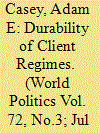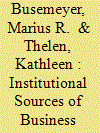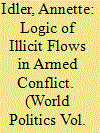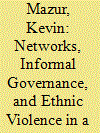|
|
|
Sort Order |
|
|
|
Items / Page
|
|
|
|
|
|
|
| Srl | Item |
| 1 |
ID:
173637


|
|
|
|
|
| Summary/Abstract |
Conventional wisdom holds that great power patrons prop up client dictatorships. But this is generally assumed rather than systematically analyzed. This article provides the first comprehensive analysis of the relationship between foreign sponsorship and authoritarian regime survival, using an original data set of all autocratic client regimes in the postwar period. The results demonstrate that patronage from Western powers—the United States, France, and the United Kingdom—is not associated with client regime survival. Rather, it’s only Soviet sponsorship that reduced the risk of regime collapse. The author explains this variation by considering the effects of foreign sponsorship on the likelihood of military coups d’état. He argues that the Soviet Union directly aided its clients by imposing a series of highly effective coup prevention strategies. By contrast, the US and its allies didn’t provide such aid, leaving regimes vulnerable to military overthrow.
|
|
|
|
|
|
|
|
|
|
|
|
|
|
|
|
| 2 |
ID:
173638


|
|
|
|
|
| Summary/Abstract |
Recent years have seen a revival of debates about the role of business and the sources of business power in postindustrial political economies. Scholarly accounts commonly distinguish between structural sources of business power, connected to its privileged position in capitalist economies, and instrumental sources, related to direct forms of lobbying by business actors. The authors argue that this distinction overlooks an important third source of business power, which they conceptualize as institutional business power. Institutional business power results when state actors delegate public functions to private business actors. Over time, through policy feedback and lock-in effects, institutional business power contributes to an asymmetrical dependence of the state on the continued commitment of private business actors. This article elaborates the theoretical argument behind this claim, providing empirical examples of growing institutional business power in education in Germany, Sweden, and the United States.
|
|
|
|
|
|
|
|
|
|
|
|
|
|
|
|
| 3 |
ID:
173636


|
|
|
|
|
| Summary/Abstract |
Day-to-day policing represents a fundamental interface between citizens and states. Yet even in the most capable states, local policing varies enormously from one community to the next. The authors seek to understand this variation and in doing so make three contributions: First, they conceptualize communities and individuals as networks more or less capable of demanding high-quality policing. Second, they present original survey data and semistructured interviews on local policing from over one hundred sixty slums, eight thousand households, and one hundred seventy informal neighborhood leaders in India that contribute to the nascent empirical work on comparative policing and order. Third, they find evidence that well-connected individuals and densely connected neighborhoods express greater confidence in and satisfaction with local policing. Critically, these differences do not appear to be a function of a lower propensity for local conflict but rather of an increased capacity to leverage neighborhood leaders to mediate relations with the police. The combination of analytics and empirics in this article provides insight into the conditions under which individuals and communities experience the police as expropriators of rents or neutral providers of order.
|
|
|
|
|
|
|
|
|
|
|
|
|
|
|
|
| 4 |
ID:
173635


|
|
|
|
|
| Summary/Abstract |
Why is there variation in how violent nonstate groups interact in armed conflict? Where armed conflict and organized crime converge in unstable regions worldwide, these groups sometimes enter cooperative arrangements with opposing groups. Within the same unstable setting, violent nonstate groups forge stable, long-term relations with each other in some regions, engage in unstable, short-term arrangements in others, and dispute each other elsewhere. Even though such paradoxical arrangements have intensified and perpetuated war, extant theories on group interactions that focus on territory and motivations overlook their concurrent character. Challenging the literature that focuses on conflict dynamics alone, the author argues that the spatial distribution of illicit flows influences how these interactions vary. By mapping cocaine supply chain networks, the author shows that long-term arrangements prevail at production sites, whereas short-term arrangements cluster at trafficking nodes. The article demonstrates through process tracing how the logic of illicit flows produces variation in the groups’ cooperative arrangements. This multiyear, multisited study includes over six hundred interviews in and about Colombia’s remote, war-torn borderlands.
|
|
|
|
|
|
|
|
|
|
|
|
|
|
|
|
| 5 |
ID:
173639


|
|
|
|
|
| Summary/Abstract |
In cross-national studies, ethnic exclusion is robustly associated with the onset of violent challenge to incumbent regimes. But significant variation remains at the subnational level—not all members of an excluded ethnic group join in challenge. This article accounts for intra-ethnic group variation in terms of the network properties of local communities, nested within ethnic groups, and the informal ties that regimes forge to some segments of the ethnically excluded population. Mobilization within an excluded ethnic group is most likely among local communities where members are densely linked to one another and lack network access to state-controlled resources. Drawing on a case study of the Syrian city of Homs in the 2011 uprising, this article demonstrates how the Syrian regime’s strategies of managing the Sunni population of Homs shaped patterns of challenge. On the one hand, the state’s toleration of spontaneous settlements on the city’s periphery helped to reproduce dense network ties. On the other hand, the regime’s informal bargains with customary leaders instrumentalized those ties to manage local populations. These bargains could not withstand the regime’s use of violence against challengers, which meant that these same local networks became crucial factors in impelling and sustaining costly antiregime mobilization.
|
|
|
|
|
|
|
|
|
|
|
|
|
|
|
|
|
|
|
|
|